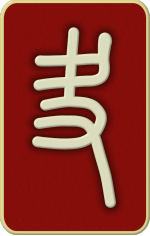
夬 Guài Breakthrough (Resolution) [hexagram 43]


Lake over Heaven
 Metal element
Metal element
Lunar month: 3 ; Host (controlling) line : 5
The Decision
Testimony at court; a truthful declaration in a grave matter. The whole community will hear about it; desist from turning to violence. Favorable to undertake something new.
Breakthrough, the strong displace the weak. Disruption yet harmony persists. ‘Testimony at court’ – the yielding is above five strong lines. ‘A truthful declaration in a grave matter’ – realization of the danger allows it to be handled brilliantly. ‘The whole community will hear about it; desist from turning to violence’ – as that would leave no way out. ‘Favorable to undertake something new’ – when strength endures then the disruption will end.
夬: 扬于王庭, 孚号, 有厉, 告自邑, 不利即戎, 利有攸往. Guài: yáng yú wáng tíng, fú hào, yǒu lì, gào zì yì, bù lì jí róng, lì yǒu yōu wǎng.
彖传: 夬, 决也, 刚决柔也. 健而说, 决而和, 扬于王庭, 柔乘五刚也. 孚号有厉, 其危乃光也. 告自邑, 不利即戎, 所尚乃穷也. 利有攸往, 刚长乃终也. Tuàn zhuàn: Guài, jué yě, gāng jué róu yě. Jiàn ér shuō, jué ér hé, yáng yú wáng tíng, róu chéng wǔ gāng yě. Fú hào yǒu lì, qí wēi nǎi guāng yě. Gào zì yì, bù lì jí róng, suǒ shàng nǎi qióng yě. Lì yǒu yōu wǎng, gāng cháng nǎi zhōng yě.
The Image
Lake ascending to the sky forms ‘Breakthrough’. The wise give favor to those below and do not waste talent.
象传: 泽上于天, 夬; 君子以施禄及下, 居德则忌. Xiàng zhuàn: Zé shàng yú tiān, guài; jūn zǐ yǐ shī lù jí xià, jū dé zé jì.
Line Change 1
Mighty down to the toes; striding forward but failing. Mistakes are made.
‘Striding forward but failing’ – a mistake.
初九: 壮于前趾, 往不胜为咎. Chū jiǔ: zhuàng yú qián zhǐ, wǎng bù shèng wèi jiù.
象传: 不胜而往, 咎也. Xiàng zhuàn: Bù shèng ér wǎng, jiù yě.
Line Change 2
A cry of alarm. Fears of an attack at night but no need to worry.
‘Fears of an attack at night but no need to worry’ – finding the middle way.
九二: 惕号, 莫夜有戎, 勿恤. Jiǔ èr: tì hào, mò yè yǒu róng, wù xù.
象传: 莫夜有戎, 得中道也. Xiàng zhuàn: Mò yè yǒu róng, dé zhòng dào yě.
Line Change 3
Determination shows in the face. Misfortune. The wise with great resolution proceed alone into the rain; although getting wet is disagreeable there is no blame.
‘The wise with great resolution’ – eventually not a mistake.
九三: 壮于頄, 有凶. 君子夬夬, 独行, 遇雨, 若濡, 有愠, 无咎. Jiǔ sān: zhuàng yú qiú, yǒu xiōng. Jūn zǐ guài guài, dú xíng, yù yù, ruò rú, yǒu yùn, wú jiù.
象传: 君子夬夬, 终无咎也. Xiàng zhuàn: Jūn zǐ guài guài, zhōng wú jiù yě.
Line Change 4
Raw, painful backside. Walking slowly with difficulty. Led like sheep but regrets will pass. However, when hearing the verdict, it is not understood.
‘Walking slowly with difficulty’ – an inappropriate place. ‘However, when hearing the verdict it is not understood’ – heard but not comprehended.
九四: 臀无肤, 其行次且. 牵羊悔亡, 闻言不信. Jiǔ sì: tún wú fū, qí xíng cì qiě. qiān yáng huǐ wáng, wén yán bù xìn.
象传: 其行次且, 位不当也. 闻言不信, 聪不明也. Xiàng zhuàn: Qí xíng cì qiě, wèi bù dàng yě. wén yán bù xìn, cōng bù míng yě.
Line Change 5
Weeds need eradicating with firm determination. Taking the middle path is free from blame.
‘Taking the middle path is free from blame’ – however the central way is not yet clear.
九五: 苋陆夬夬, 中行无咎. Jiǔ wǔ: xiàn lù guài guài, zhōng háng wú jiù.
象传: 中行无咎, 中未光也. Xiàng zhuàn: Zhōng háng wú jiù, zhōng wèi guāng yě.
Line Change 6
A cry for help gets no response. In the end troubles will come.
‘A cry for help gets no response’ – eventually unable to remain.
上六: 无号, 终有凶. Shàng liù: wú hào, zhōng yǒu xiōng.
象传: 无号之凶, 终不可长也. Xiàng zhuàn: Wú hào zhī xiōng, zhōng bù kě cháng yě.
The full set of 64 English translations is available in our new book 'Book of Changes - Deciphered' ➚.